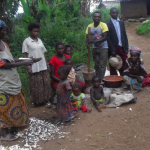 “I Intend to mobilize the women of the [African] Great Lakes Region countries to play an active role of the PSC [Peace Security and Cooperation] Framework,” UN Envoy to the Great Lakes Region, Ms Mary Robinson told the United Nations Security Council this Monday May 6, 2013.
“I Intend to mobilize the women of the [African] Great Lakes Region countries to play an active role of the PSC [Peace Security and Cooperation] Framework,” UN Envoy to the Great Lakes Region, Ms Mary Robinson told the United Nations Security Council this Monday May 6, 2013.
Ms Mary Robinson made the statement while briefing the UN Security Council after a week long trip in the African Great Lakes Region. The trip started in the Democratic Republic of the Congo (DRC), and ended in Ethiopia, via Rwanda, Uganda, Burundi, and South Africa. It was the first briefing after being appointed United Nations Envoy for Africa’s Great Lakes Region.
The briefing was delivered, via video conferencing, to the UN Security Council meeting behind closed door
Ms Robinson warned the UN Security Council that this may be the last chance after so many failed initiatives.
“There is a fresh chance to do more than just attend to the consequences of conflict, or to manage crises of the kind seen again most recently last November. There is a chance to resolve its underlying causes and to stop it for good… We can be sure that if it fails, the consequences will be grave.”
The need for a UN Envoy post was reinforced during the February 24, 2013 meeting in Addis-Abeba, Ethiopia when the presidents of the region signed the PSC Framework and agreed to work together to find peace in the region (see our article UN Special Envoy in Great Lakes: Will Rwandan President Kagame Seize the Opportunity of March 7, 2013)
According to the UN envoy, there is a “renewed opportunity” for peace in the Democratic Republic of the Congo (DRC), where foreign and national armed groups have been wrecking havoc for several years. Most of these groups are funded by foreign governments. One such violent militia known as M23 was founded, funded, armed, and reinforced by Rwandan government leaders (see: UN Experts on DRC, Belgian Bernard Leloup and Moldovan Marie Plamadiala, targeted by Rwandan Government.
In March, the UN Security Council authorized the deployment of an intervention brigade within UN Peace keeping mission in the DRC, MONUSCO, to carry out targeted offensive operations, with or without the Congolese national army, known as FARDC, against these armed groups, especially M23 rebels. The UN Envoy expressed concerns about the potential consequences of military operations and emphasized that military operations are only one tool of a multi-phased approach that should favor political solutions. The Intervention Brigade “while an important tool, should be seen as one element of a much larger political process aimed at finding a comprehensive solution to the crisis in eastern DRC,” the UN Envoy told the UN Security Council.
Despite the optimism by the UN Envoy, there is growing tension in the region and fear of escalation and humanitarian chaos when the war starts. M23 rebels have threatened to kidnap peace keeping forces and stated that they are ready for war (see our article: M23 Rebels High Command Orders Kidnapping of South African Military Troops of April 13, 2013. Last week, the President of Tanzania, one the countries that, along with Malawi and South Africa, will contribute the bulk of troops forming the intervention brigade, vowed to crush the M23 rebels if they do not behave.
According to many observers and people on the ground, M23 rebels appear ready for war on surface, but are deeply seeking a way out without a fight. Rwandan leaders hold the key and have been rearming, resupplying and reinforcing M23 rebels with advanced weapons and fresh well trained troops. At the same time, Rwandan leaders are under intense international pressure to stop supporting the rebels. It is expected that once the Intervention Brigade is deployed this July 2013 and the promised drones are functioning, Rwandan government may find it hard to continue supporting the rebels. That is perhaps why, according to sources in Kigali, Rwandan Government has also toned down its rhetoric and is seeking all options to get out of the process without admitting being the root of the conflict, even if it gets to sacrificing M23 rebels leadership. Without the support from Rwandan Military, the rebels structure is expected to collapse.
Meanwhile, eyes are pointed to concrete next steps. According to Ms. Robinson, her first trip, from April 28 – May 5, 2013 was to “listen”. Perhaps the next trip, planned for the end of May 2013 will be to propose solutions.
Whatever her solutions, Ms. Robinson has stated that women involvement is crucial and she intends to mobilize women and women organizations including Femmes Africa Solidarité, her preferred organization.
Until then or maybe as long as the Intervention Brigade has not arrived, the Great Lakes Region of Africa continues to wait for the illusive peace.
©2013 AfroAmerica Network. All Rights Reserved.




Comments on this entry are closed.